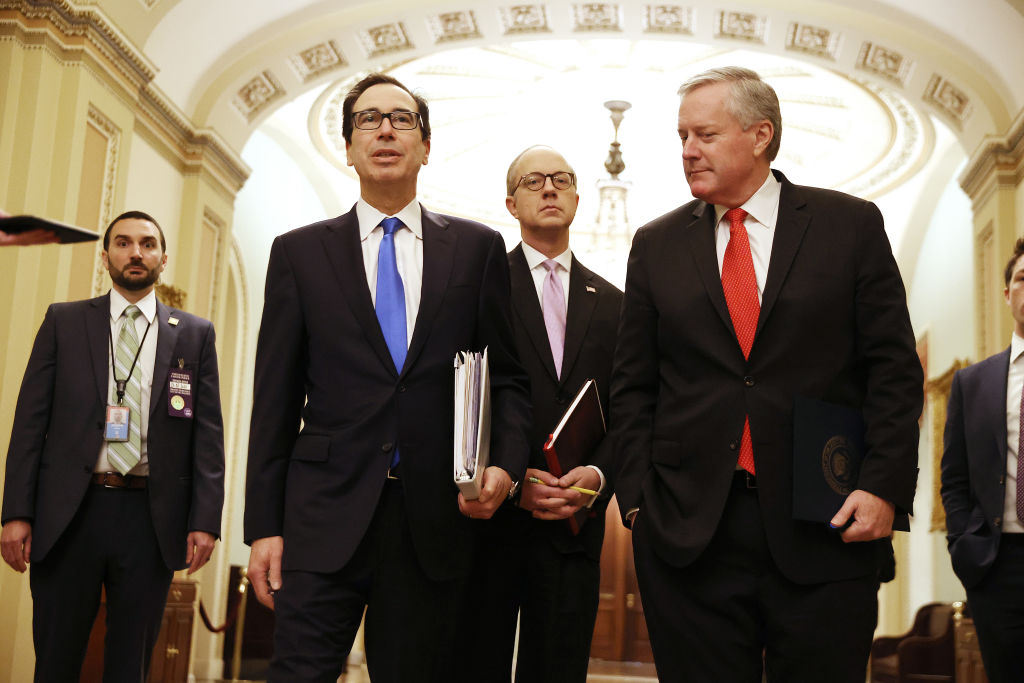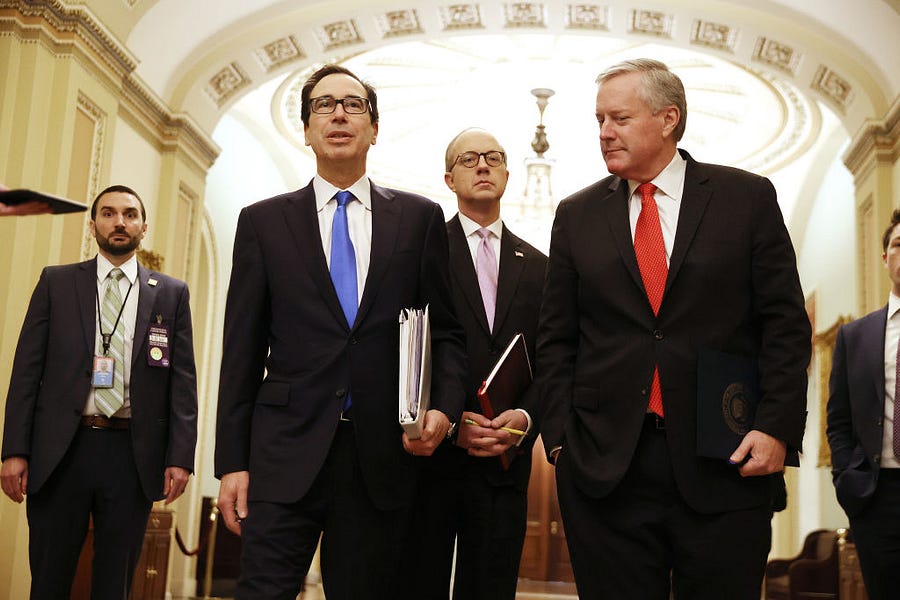Hello fellow Omphaloskeptics,
Since we’re just talking among friends—by which I mean Dispatch Members in Full, and the several imaginary friends in the car with me as I smoke a cigar and bang out a Wodin’s Day correspondence—I’m gonna try to do this notebook style. I don’t mean The Notebook style, with James Garner reading it to you, with flashbacks to rain-soaked Ryan Gosling and Rachel McAdams rejecting social distancing in the 1940s. I mean I’m going to drop a few observations with only stylistic sinew connecting them.
Today’s Morning Dispatch began, “Wake up and smell the stimulus: Trump, Schumer, McConnell, and Joe Manchin all finally have a $2 trillion deal they can all live with…”
I grimaced at this when I read it. Not because I’m against the legislation, though I have my concerns. I grimaced because I meant to say something to my colleagues about the word “stimulus.” This isn’t a stimulus bill, it’s a life-support bill. It’s the difference between cocaine and oxygen, or between a shot of adrenaline and a blood transfusion. I think it was Larry Summers who first compared what we’re doing to putting the economy in a medically induced coma. Induced comas—if I know my medical TV-drama lingo—are sometimes necessary to protect the brain from certain threats. But there’s no point in inducing a coma if you don’t keep the person on life support in some way.
Cocaine is what you take when Alejandro Sosa’s hit squad shows up at your Miami estate, looking to take you out for failing to assassinate a crusading journalist exposing Colombia’s drug trade. More relevant, adrenaline is something that doctors might give you to wake you from a coma—or, in a situation closer to my medical expertise, you might give it to someone like, say, Mia Wallace (who was in a coma-like state) to wake them up from a heroin overdose.

Anyway, you get the point. We’re not trying to stimulate the economy. We’re trying to keep it on life support while we ride out this pandemic. The stimulus part comes later.
In my colleagues’ defense, stimulus is the word everyone is using so using it too is defensible, I guess. I just think the word everyone is using is wrong.
Speaking of using words incorrectly, I honestly don’t know if there’s any such word as “omphaloskeptic.” I’m just working on the assumption that a person who practices omphaloskepsis is an omphaloskeptic. If you didn’t know—or Google it already—omphaloskepsis was originally the practice of contemplating your navel as a means of meditating but has come to mean self-indulgent or self-absorbed. Some might even say it’s the official word of this “news”letter.
Anyway, since someone around here brought up misused words, let’s talk about chloroquine. A few days ago, a couple took chloroquine phosphate as a prophylactic treatment for the coronavirus. The wife got very sick and is in the ICU. The husband died in front of her. I don’t want to be insensitive, but this was a very dumb thing to do.
They made this Darwin Award-level mistake because they heard Donald Trump talk about the drug hydroxychloroquine as a potential game-changing treatment for the coronavirus. NBC ran the story breathlessly as an indictment of the president and it was shared widely for the same purpose. I agree with Charlie Cooke that what NBC did was wildly sensationalistic and indefensible. If your immediate reaction to finding a jar of fish tank cleaner is to swallow the contents because you heard the president talk about a drug with a similar name (and is often shortened to just “chloroquine”), it’s not the president’s fault. It’s somewhat equivalent to watching a Coke commercial and running out to score some Peruvian marching powder.
The Trump-fake news symbiosis.
But this whole sad story illuminates a dynamic that is causing me to despair during this crisis. I think the president’s news conferences are borderline outrageous. Donald Trump has spent his entire life as a salesman, marketer, and promoter. One can imagine someone with those career skills being useful in a national crisis. But that’s a hypothetical. In reality, Trump’s tactics, instincts, and muscle memory are uniquely ill-suited to this crisis.
One of Trump’s businesses was a urine test that could diagnose your vitamin deficiencies. It was a bogus product (it was also a pyramid scheme). No such urine test exists. “It’d be nice if there was,” Katie Ferraro, a registered dietitian and assistant clinical professor of nutrition at the University of California-San Francisco School of Nursing told Healthline. “Basically, this is all imaginary,” Pieter Cohen, assistant professor of medicine at the Cambridge Health Alliance in Massachusetts, told the outlet.
When selling products like urine tests and quasi-bogus vitamin supplements, or steaks, condos, bottled water, and other products in the Trump line, the key—at least for Trump—was always getting people to “yes.” “Get them to sign on the line that is dotted,” as they say in Glengarry Glen Ross. The details can be worked out later—or not. Who cares after you separate the mark from a check? Throughout Trump’s candidacy and presidency, his skill at pitching the sizzle without much concern for the reality of the steak has served him remarkably well. When you have a large network of enablers willing to trumpet the rhetoric over the reality, you can get away with a lot. When you have large swaths of voters who’ve been convinced to take his word over anything contradictory they may hear from the media or experts, it’s even easier.
I won’t dwell on this because a) I think it is incandescently obvious, b) If you don’t think so, nothing I can say here will convince you otherwise—at least nothing I can say with even a modicum of brevity—and c) Because that’s not the point I want to make.
Trump should not have been touting chloroquine—the drug, not the koi pond cleanser. And at least, when pressed (and only when pressed), he admitted that he was basing his optimism on nothing more than a “feeling” and his confidence that he’s a “pretty smart guy.”
This warrants getting a little in the weeds. Anthony Fauci was asked:
And to Dr. Fauci, if I could. Dr. Fauci—this was explained yesterday—there has been some promise with hydroxychloroquine as potential therapy for people who are infected with coronavirus. Is there any evidence to suggest that, as with malaria, it might be used as a prophylaxis against COVID-19?
Anthony Fauci gave a detailed answer, but he began with a declarative statement: “No. The answer is no. And the evidence that you’re talking about, John, is anecdotal evidence.”
Prophylaxis means preventative. The drug is used to prevent contracting malaria. There is zero evidence that taking hydroxychloroquine prevents contracting the disease. All of the relevant cases of its use are about treatment, not prevention.
Now, I am fairly certain Trump doesn’t know what prophylaxis means. But he marched back to the microphone to say that what the doctor said was correct, but he remains a “big fan” of the drug and, later, about how it could be a “game changer.”
My first point here isn’t that Trump is wrong. I hope he’s not. Though even if he’s right, it won’t prevent the virus, it will help treat it.
My second point is that he shouldn’t be up there using his impressive piss test skills to hawk something he knows very little about, particularly when his own experts are clearly trying to rein him in. He’s confusing people, including tragically dimwitted ones who come away from such discussions thinking they should ingest fish pond cleanser.
My main point isn’t just that he’s confusing the public, sending mixed signals on this drug, but also the whole pandemic. He’s also creating an environment where the press loses its mind and chases stories and angles that don’t help either. The press corps—or elements of it—isn’t going out and eating poison, but it is obsessed with scoring points against the president. That doesn’t speak well of them and they deserve to be criticized for it.
But the problem is that both sides feed off the other’s excesses. Trump vomits up word salads intended to bolster his political standing and substitute for the psychic sustenance of his rallies, and the press takes the bait. They get out over their skis so that the cast of Morning Joe can laugh at what an irresponsible idiot he is, and his fans can point at the excesses as proof that the Fake News is the “enemy of the people.” Everyone plays their assigned role.
As depressing as this dynamic was during impeachment and all the other beltway dramas, it was basically self-contained to cable shout-shows, radio Jeremiahs, the Resistance, and MAGA pundits. Most normal people tuned it out or took it all with a grain of salt. This crisis is a wholly different situation. Early on, Trump’s most reliable sycophants were perfectly happy to peddle the “hoax” line.
And yes, I know, he didn’t call the virus a hoax, he called the charge that he wasn’t responding responsibly to the virus a hoax. Though all of his hoax talk was all the permission some of his fans needed to make the full “Deep State” hoax argument, and he did nothing to stop them. The mere fact that I have to make this clarification buttresses my point. The press misquotes Trump’s claim and his defenders get to argue about the unfairness of the misrepresentation rather than deal with the fact that he did drop the ball in the early days. The mainstream media takes that bait and the cycle perpetuates itself.
It’s all so grotesquely irresponsible, self-absorbed and self-indulgent. But that’s where we are in this pandemic of omphaloskepsis.
Photograph by Chip Somodevilla/Getty Images.







Please note that we at The Dispatch hold ourselves, our work, and our commenters to a higher standard than other places on the internet. We welcome comments that foster genuine debate or discussion—including comments critical of us or our work—but responses that include ad hominem attacks on fellow Dispatch members or are intended to stoke fear and anger may be moderated.
With your membership, you only have the ability to comment on The Morning Dispatch articles. Consider upgrading to join the conversation everywhere.